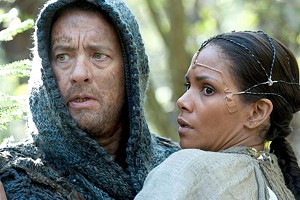Published October 31, 2012 at 11:38 a.m.
With Hollywood in its current conservative mode, recycling tired franchises left and right, it’s tempting to applaud the sheer out-there-ness of Cloud Atlas. This adaptation of David Mitchell’s 2004 novel is philosophically high-minded and sprinkled with inadvertent hilarity; the phrase "Pirates of the Caribbean does postmodernism" comes to mind. So does “train wreck.” But, as Oscar-season spectacles go, Cloud Atlas is far from forgettable.
Like the novel, the film incorporates six separate stories, each set in a different era, with two in the future. This mega- (and frequently meta-) narrative is staged by three directors known for both risk taking and unevenness: Lana and Andy Wachowski (The Matrix, Speed Racer) and Tom Tykwer (Run Lola Run, The Princess and the Warrior).
Rather than presenting the tales in large sequential chunks, as Mitchell did, the filmmakers intercut them — sometimes rapidly — to emphasize the narrative parallels. Taking that principle further, the same core cast appears in each story.
Thus, for instance, in the 1850 segment, Jim Sturgess plays a Californian heir on an ill-fated Pacific voyage. In the 2144 segment, set in a dystopian “Neo Seoul,” he becomes a freedom fighter who assists in the spiritual awakening of a mass-manufactured clone (Doona Bae). The other lead roles belong to Ben Whishaw, as a penniless composer in 1936 Europe; Halle Berry, as a muckraking journalist in 1975 San Francisco; Jim Broadbent, as an amoral publisher in the present-day UK; and Tom Hanks, as a neo-primitive tribesman in postapocalyptic America.
It sounds confusing, but it isn’t, at least not to anyone who can keep up with Oscar montages showcasing the high points of a genre or an actor’s career. Cloud Atlas often feels like one of those montages: a string of climaxes with no quiet time for character development. Keeping track of the disparate stories is plenty stimulating for the viewer, but plot developments rarely transcend the level of cliché. Unlike Mitchell, who used each tale to riff self-consciously on a particular literary style, the filmmakers mostly play the conventions straight. They’re busy drumming the overarching themes — standard stuff about karma, interconnectedness and the Golden Rule — into our heads.
The funniest and best-realized story — Broadbent’s — is also the least connected to anything else, while the tale positioned to have the strongest emotional resonance — the postapocalyptic one — is ludicrous in a more unfortunate way.
Anyone who attends community theater is familiar with the phenomenon of the resident ham, an actor with such presence that he manages to hog all the colorful roles (and wigs and accents). In the $100 million pageant that is Cloud Atlas, Hanks is that guy. But when he’s asked to play a conflicted naïf full of pathos, dressed in rags and speaking an invented futuristic dialect, his powers are at an end. Try as he may, Hanks can’t sell the magical realism, and his conversations with Berry in pidgin English are fiascos of Wicker Man remake proportions.
Of course, if you don’t like that story, you’ll soon be back in a better one. Cloud Atlas may be the first film epic that panders to the viewing habits of surfers and browsers without maligning their intellects. The Wachowskis and Tykwer realize that just because you watch three movies at once while checking actors’ filmographies on your iPhone doesn’t mean you can’t enjoy narratives considerably more complex than Bang! Pow! With any luck, they’ll start a trend: I, for one, would be happy to watch next summer’s entire crop of forgettable flicks in three-hour mash-up format.
More By This Author
Speaking of Movies, movie Review
-

Next Month Brings the Final Curtain for Palace 9 Cinemas
Oct 27, 2023 -

Book Review: 'Save Me a Seat! A Life With Movies,' Rick Winston
Aug 30, 2023 -

Steve MacQueen Named Executive Director of Vermont International Film Festival
May 22, 2023 -

Vermonters Are Going Back to the Movies — Under the Stars
Aug 26, 2020 -

Where to Catch a Movie Near Burlington
Sep 11, 2018 - More »
Comments
Comments are closed.
From 2014-2020, Seven Days allowed readers to comment on all stories posted on our website. While we've appreciated the suggestions and insights, right now Seven Days is prioritizing our core mission — producing high-quality, responsible local journalism — over moderating online debates between readers.
To criticize, correct or praise our reporting, please send us a letter to the editor or send us a tip. We’ll check it out and report the results.
Online comments may return when we have better tech tools for managing them. Thanks for reading.












































